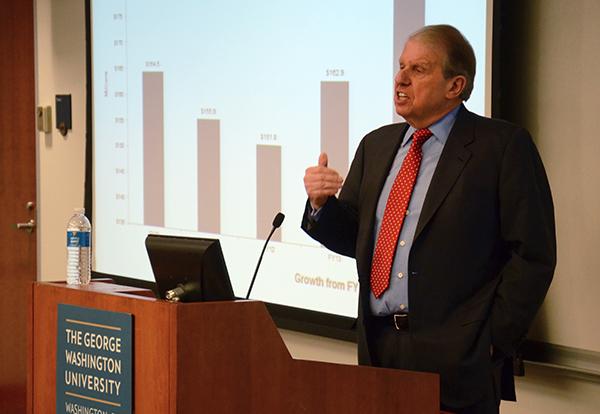Updated: Jan. 14, 2015 at 3:29 p.m.
GW’s research is no longer domestic.
Leo Chalupa, vice president for research, told the Faculty Senate on Friday that he will focus on helping professors earn funding from international sources, an area researchers have already started tapping into without a push from the University.
With an extremely competitive national climate for funding, international grants may be the only way GW can grow its research portfolio. And now researchers will have a chance to receive money from the European Union after laws that originally set aside money just for European researchers were overhauled.
“The EU office is just across Pennsylvania [Avenue] from Rice Hall,” Chalupa said. “There’s a lot of untapped money out there.”
Chalupa said 8 percent of the University’s extramural research includes an international component despite no concerted effort by administrators. But he hopes to increase that percentage by offering 20 grants, each worth $5,000, to researchers to travel internationally and meet with potential collaborators.
He has also hired a former top National Science Foundation official to identify grants that could be good fits for GW.
Chalupa has started to invite EU representatives to campus to hold workshops for interested researchers about how to best apply or be awarded grants by the overseas coalition.
“Part of the European 2020 vision is to have collaboration,” he said. “They’re willing to fund the best science no matter where it is.”
Even though it’s a potential area of growth for GW’s researchers, Chalupa said the rules that go along with working with a different country could present difficulties to grant applicants.
“We had a faculty member who received a significant grant from Russia a few years ago,” he said. “We did some research and found out that someone who had previously received the grant had violated part of the contract and got six months in prison, so we chose to turn down that grant.”
Jeffrey Bethony, an associate professor in the School of Medicine and Health Sciences, said his lab had already received grants from the EU and the Dutch government.
He said his team, which helps to develop vaccines for tropical diseases like malaria, needs more funding from non-corporate sources because he can rarely turn a profit from his studies.
“To have the Dutch government come in and help us – people who realize that we still really need to do more research – is extremely helpful,” he said.
This post was updated to reflect the following correction:
The Hatchet incorrectly reported that 22 percent of GW’s extramural research includes an international component. It is actually 8 percent. We regret this error.







